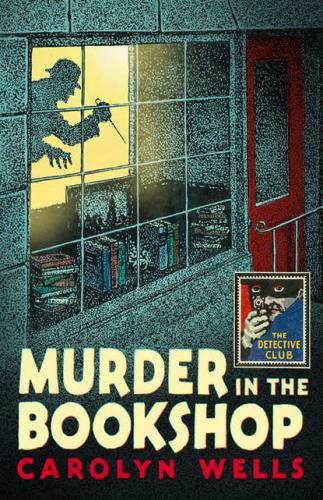‘THE DETECTIVE STORY CLUB is a clearing house for the best detective and mystery stories chosen for you by a select committee of experts. Only the most ingenious crime stories will be published under the THE DETECTIVE STORY CLUB imprint. A special distinguishing stamp appears on the wrapper and title page of every THE DETECTIVE STORY CLUB book—the Man with the Gun. Always look for the Man with the Gun when buying a Crime book.’
Wm. Collins Sons & Co. Ltd., 1929
Now the Man with the Gun is back in this series of COLLINS CRIME CLUB reprints, and with him the chance to experience the classic books that influenced the Golden Age of crime fiction.
COLLINS CRIME CLUB
an imprint of HarperCollinsPublishers Ltd
1 London Bridge Street
London SE1 9GF
This Detective Club edition published 2018
First published in the USA by Grosset & Dunlap 1936
‘The Shakespeare Title-Page Mystery’ published in The Dolphin by the Limited Editions Club 1940
Introduction © Curtis Evans 2018
Cover design © HarperCollinsPublishers Ltd 2018
Carolyn Wells asserts the moral right to be identified as the author of this work.
A catalogue copy of this book is available from the British Library.
This novel is entirely a work of fiction. The names, characters and incidents portrayed in it are the work of the author’s imagination. Any resemblance to actual persons, living or dead, events or localities is entirely coincidental.
All rights reserved under International and Pan-American Copyright Conventions. By payment of the required fees, you have been granted the non-exclusive, non-transferable right to access and read the text of this e-book on screen. No part of this text may be reproduced, transmitted, down-loaded, decompiled, reverse engineered, or stored in or introduced into any information storage and retrieval system, in any form or by any means, whether electronic or mechanical, now known or hereinafter invented, without the express written permission of HarperCollins.
Source ISBN: 9780008283025
Ebook Edition © November 2018 ISBN: 9780008283032
Version: 2018-08-24
TO MY LONG-TIME FRIENDS
MR AND MRS ALFRED F. GOLDSMITH
THIS BOOK IS DEDICATED
IN ALL GOOD-WILL
Contents
Copyright
Dedication
Introduction
I. THE CRIME IN THE BOOKSHOP
II. RAMSAY’S WORD IS DOUBTED
III. GUY DEMANDS HIS RIGHTS
IV. FLEMING STONE TAKES THE CASE
V. INQUIRIES
VI. STONE AND HIS SUSPECTS
VII. A LIST OF SUSPECTS
VIII. THE PASTED LETTER AND ANOTHER
IX. THE OTHER
X. THE DEATH OF THE SCION
XI. ALLI RESPONDS TO THE LETTER
XII. WHERE DID ALLI GO?
XIII. RAMSAY GETS BUSY
XIV. BENSON BUSY TOO
XV. STONE STARTS ON HIS QUEST
XVI. THE AWFUL BIG MAN
XVII. HELD BY THE ENEMY
XVIII. AFTER ALL
THE SHAKESPEARE TITLE-PAGE MYSTERY
The Detective Story Club
About the Publisher
THE resurgence of popular interest in vintage mystery fiction of the twentieth century has led to the revival of a steadily mounting number of crime writers whose works, though often extremely popular in their day, had long lain out of print and been mostly forgotten outside of occasional, cursory references in studies by genre specialists. One such renascent author is American Carolyn Wells, who once was characterized, in a 1968 magazine article by John Dickson Carr, past master of the locked-room mystery, as one of mystery fiction’s ‘lost ladies now well lost’. Today, a half-century after Carr penned those sad words, vintage mystery fans again are finding their way to the detective fiction of Carolyn Wells, and the former ‘lost lady’, now happily redeemed, is enjoying renewed popularity. This is a remarkable reversal of fortune which would, no doubt, have immensely amused the author, a woman known for her wryly humorous outlook on the myriad blows and buffets of life.
Born on 18 June 1862 in the town of Rahway, New Jersey to parents whom she termed ‘the very ultramarine of Blue Presybyterians’, Carolyn Wells, though comfortably circumstanced in a material sense, received at an early age some sharp slaps from the hand of Fate. Two of Carolyn’s four siblings died in childhood, one from the same scarlet fever contagion that had struck her as well, leaving the future author’s hearing progressively impaired over time. For the rest of her life she had to wear hearing aids to make speech partially audible. ‘[Deafness] doesn’t bother me so much,’ Wells later wrote forthrightly, ‘but it is a hardship, and though I bear it smilingly it is an insincere smile.’
After graduating as valedictorian from Rahway High School, Carolyn Wells remained at the family home with her parents and her surviving sister, though she took classes with noted Shakespearean scholar William James Rolfe in Cambridge, Massachusetts and for years found a prized personal outlet in her service as head librarian at the Rahway Public Library. Wells departed the family nest for good at the age of 55 when in 1918 she wed Hadwin Houghton, a 62-year-old widower and cousin of a co-founder of the publishing firm of Houghton, Mifflin. The couple took up residence in Manhattan at the newly erected Hotel des Artistes, an elegant and exclusive apartment building overlooking Central Park that was later home for a time to such luminaries as Rudolf Valentino, Norman Rockwell and Noël Coward; but their connubial bliss was short-lived, Houghton passing away in 1919. ‘I had him with me but a few years,’ Wells fondly recalled of her beloved spouse, ‘and those were so crammed with joyful interest that they are now my most blessed memory.’ As a widow Wells remained in New York, residing with her housekeeper-companion and a cook at the same apartment at the Hotel des Artistes until her own death nearly a quarter-century later, in 1942.
Carolyn Wells made her entrée into the literary world through her interest in the nonsense literature of English authors
